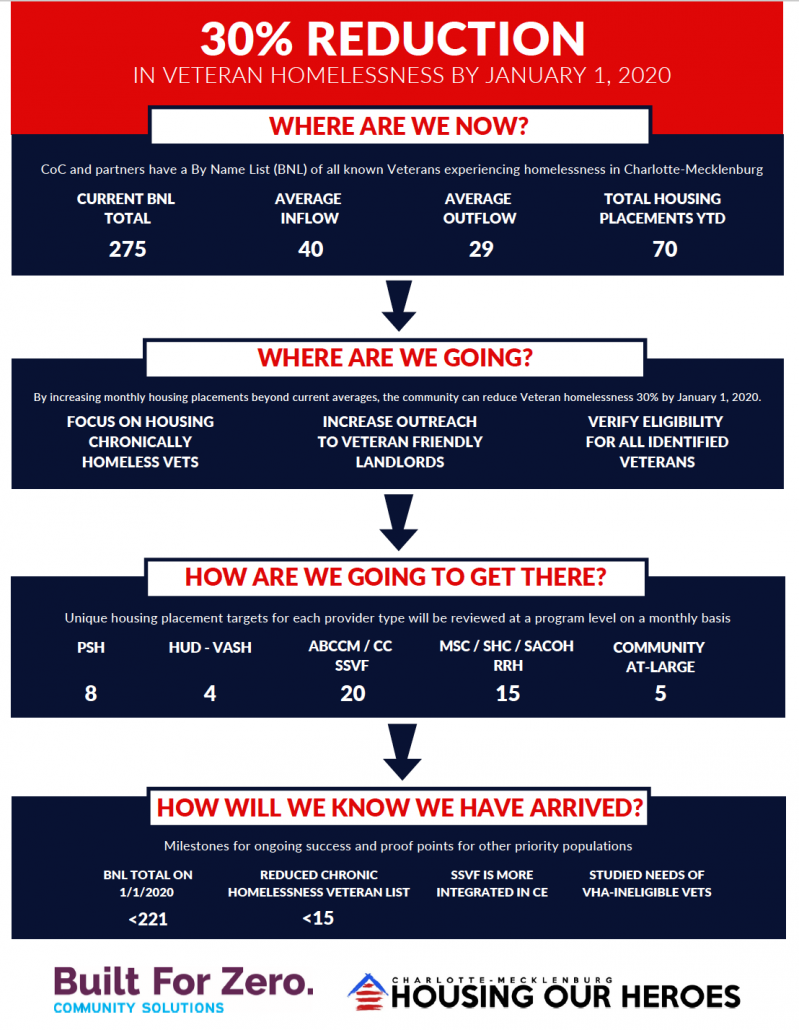Kally Canfield
Built for Zero, Charlotte-Mecklenburg
Charlotte-Mecklenburg is one of more than 70 communities participating in the Built for Zero movement. Built for Zero communities seek to change how local systems work to achieve greater impact. Built for Zero seeks to unite entities around a commitment to measurably ending homelessness while incorporating real-time, by-name data. More than half of the Built for Zero communities have achieved reductions in the number of people experiencing chronic and veteran homelessness. And, of those 11 communities have proven they can end veteran or chronic homelessness altogether.
This blog post focuses on the key messages part of the Built for Zero movement and what it means for Charlotte-Mecklenburg.
BUILT FOR ZERO: BACKGROUND
Homelessness is an issue that is costly by all possible measures. It is an issue that is costly in human life: the health and safety of those experiencing homelessness. It is expensive for municipalities and damaging to civic pride. Homelessness also continues to serve as a stark reflection of historic racism and ongoing biases in our institutions, shouldered by the most vulnerable neighbors among us. But, we know it does not have to be this way.
Homelessness is a solvable problem, and one that communities are proving solvable every single day.
Built for Zero is made up of communities committed to measurably ending homelessness. These cities have re-imagined what a system equipped to end homelessness can and should be. In addition to harnessing real-time, person-specific data, Built for Zero communities promote shared accountability across providers and employ problem-solving disciplines from other sectors. The goal is to ensure that homelessness is rare overall; and brief and permanently resolved when it occurs.
Cities and counties that have successfully reduced and ended homelessness for a population have embraced five key changes:
- It takes a shift in goals, from focusing on program outcomes to getting the system to zero.
- It takes a shift in beliefs, from seeing homelessness as intractable, to solvable.
- It takes a shift in accountability, from an issue lacking clear ownership to becoming the responsibility of a command center unifying all of the actors who touch the issue.
- It takes a shift in how we understand the problem, using real-time data to give us the fullest understanding of the scale and nature of the issue.
- It takes a shift in investments, which are data-driven, targeted, and measurable in their impact.
SO, WHAT
Charlotte-Mecklenburg is a part of the Built for Zero movement as a part of the “Large City” cohort. A Built for Zero System Transformation Advisor, Kally Canfield, is assigned by Built for Zero to work with the community. Built for Zero is working with the existing Charlotte-Mecklenburg committee focused on ending veteran homelessness, Housing our Heroes, in order to reduce veteran homeless by 30% by the end of 2019.
Built for Zero team members and representatives from the U.S. Department of Veterans Affairs participated in an all-day training event for frontline staff on September 19, 2019. Staff provided input on strategies to reduce veteran homelessness as well as ideas on how to decrease the number of days it takes to move a veteran into housing once connected to a housing resource. This feedback will be used to inform and update practices to improve the system.
In 2019, Charlotte-Mecklenburg has reduced veteran homelessness by 12 percent. This progress is an indicator of what is possible when the problem is tackled as a system.
Click here to download the progress handout depicted above, which was shared during the staff training event.
Additional Materials


